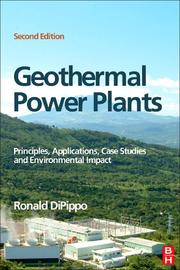| Listing 1 - 3 of 3 |
Sort by
|

ISBN: 9780080532530 0080532535 9781856174749 1856174743 1281078468 9781281078469 9786611078461 Year: 2008 Publisher: Oxford : Elsevier,
Abstract | Keywords | Export | Availability | Bookmark
 Loading...
Loading...Choose an application
- Reference Manager
- EndNote
- RefWorks (Direct export to RefWorks)
Geothermal Power Plants: Principles, Applications and Case Studies is the latest book from Ron DiPippo, Professor Emeritus, University of Massachusetts Dartmouth. It is a single resource on all aspects of the utilization of geothermal energy for electric power generation. Written in one voice by a respected authority in the field with twenty-five years of experience in geothermal research, teaching, and consulting, it is intended for those involved in any aspect of the geothermal industry. Grounded in fundamental scientific and engineering principles, its practical emphasis is enhanced by
Environmental Sciences --- Sustainable Development --- Geothermal power plants. --- Geothermal power plants --- Geothermal resources. --- Geothermal energy --- Geothermal power --- Thermal waters --- Natural resources --- Power resources --- Power-plants --- Geothermal engineering

ISBN: 1281077070 9786611077075 0080554768 0750686200 9780080554761 9780750686204 Year: 2008 Publisher: Oxford : Butterworth-Heinemann,
Abstract | Keywords | Export | Availability | Bookmark
 Loading...
Loading...Choose an application
- Reference Manager
- EndNote
- RefWorks (Direct export to RefWorks)
Ron DiPippo, Professor Emeritus at the University of Massachusetts Dartmouth, is a world-regarded geothermal expert. This single resource covers all aspects of the utilization of geothermal energy for power generation from fundamental scientific and engineering principles. The thermodynamic basis for the design of geothermal power plants is at the heart of the book and readers are clearly guided on the process of designing and analysing the key types of geothermal energy conversion systems. Its practical emphasis is enhanced by the use of case studies from real plants that increase the reader'
Geothermal power plants. --- Geothermal resources. --- Electrical Engineering --- Physical Geography --- Electrical & Computer Engineering --- Geography --- Earth & Environmental Sciences --- Engineering & Applied Sciences --- Geothermal power plants --- Geothermal energy --- Geothermal power --- Thermal waters --- Power plants, Geothermal --- Natural resources --- Power resources --- Power-plants --- Geothermal engineering
Book
Year: 2008 Publisher: Washington, D.C. : The World Bank,
Abstract | Keywords | Export | Availability | Bookmark
 Loading...
Loading...Choose an application
- Reference Manager
- EndNote
- RefWorks (Direct export to RefWorks)
This strategic framework serves to guide and support the operational response of the World Bank Group (WBG) to new development challenges posed by global climate change. Unabated, climate change threatens to reverse hard-earned development gains. The poorest countries and communities will suffer the earliest and the most. Yet they depend on actions by other nations, developed and developing. While climate change is an added cost and risk to development, a well-designed and implemented global climate policy can also bring new economic opportunities to developing countries. Climate change demands unprecedented global cooperation involving a concerted action by countries at different development stages supported by "measurable, reportable, and verifiable" transfer of finance and technology to developing countries. Trust of developing countries in equity and fairness of a global climate policy and neutrality of the supporting institutions is critical for such cooperation to succeed. Difficulties with mobilizing resources for achieving the millennium development goals and with agreeing on global agricultural trade underscore the political challenges. The framework will help the WBG maintain the effectiveness of its core mission of supporting growth and poverty reduction. While recognizing added costs and risks of climate change and an evolving global climate policy. The WBG top priority will be to build collaborative relations with developing country partners and provide them customized demand-driven support through its various instruments from financing to technical assistance to constructive advocacy. It will give considerable attention to strengthening resilience of economies and communities to increasing climate risks and adaptation. The operational focus will be on improving knowledge and capacity, including learning by doing. The framework will guide operational programs of WBG entities to support actions whose benefits to developing countries are robust under significant uncertainties about future climate policies and impacts-actions that have "no regrets."
Afforestation --- Capital Markets --- Carbon Credits --- Carbon Dioxide --- Carbon Finance --- Clean Energy --- Climate --- Climate Change --- Climate Change and Environment --- Coal --- Coastal Areas --- Credit --- Decision Making --- Deforestation --- Developed Countries --- Economic Development --- Economics --- Ecosystems --- Electricity --- Emissions --- Energy --- Energy and Environment --- Energy Efficiency --- Energy Production and Transportation --- Energy Security --- Energy Supply --- Environment --- Environment and Energy Efficiency --- Environmental Economics & Policies --- Equity --- Food Production --- Forests --- Fossil Fuels --- Gdp --- Geothermal Energy --- Hydropower --- Incentives --- Insurance --- Intergovernmental Panel On Climate Change --- International Energy Agency --- Knowledge --- Kyoto Protocol --- Land --- Malaria --- Natural Resources --- Nuclear Power --- Population Growth --- Poverty --- Power Sector --- Productivity --- Rainfall --- Renewable Energy --- Risk --- Risk Management --- Savings --- Securities --- Streams --- Temperature --- Trade --- Vehicles --- Waste --- Water --- Water Use --- Wetlands
| Listing 1 - 3 of 3 |
Sort by
|

 Search
Search Feedback
Feedback About UniCat
About UniCat  Help
Help News
News